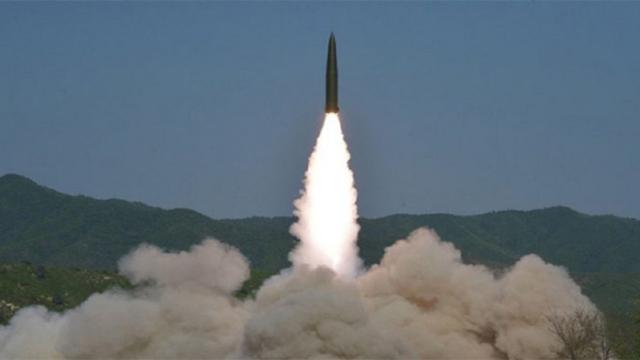The latest launch of unidentified projectiles by North Korea could be a message of sorts. Kim Jong-un’s regime is probably worried about the apparent lack of interest of the Trump administration to resolve the issue of sanctions. In order to draw the attention of the world, North Korea chose to launch the projectiles into the sea. It is the second such launch within two weeks as confirmed by officials of the United States and South Korea. The Defense Ministry of South Korea said the projectiles had a maximum range of 124 miles and a maximum altitude of 31 miles.
The Defense Ministry feels actions of this nature by the North violated agreements with Pyongyang in 2018. The intention of the agreement was to ease military tensions on the Korean Peninsula. The ministry said, "Currently, our military is monitoring related movement in case of an additional launch while maintaining thorough preparedness."
North Korea has fired three short-range missiles from its east coast, according to South Korea's military https://t.co/DXz1HeB4yk
— Sky News (@SkyNews) March 9, 2020
CNN quotes a US official as saying that North Korea fired four unidentified projectiles. The Defense Ministry of South Korea interprets these to be a part of Pyongyang's winter military drills. North Korean state media explained that its military exercises started on February 28.
The date was significant because it was the first anniversary of the summit in Hanoi between the leaders of North Korea and the United States. It failed to arrive at any deal in spite of a good rapport at the highest level.
United States monitoring the situation in North Korea
Launch of the unidentified projectiles after a lull is a matter that has the United States and South Korea worried. Last year, North Korea test-fired more than a dozen missiles. Of course, it did not fire any intercontinental-range missiles. In September, Donald Trump did not assign much importance to it and had described them as "very standard." In his opinion, they did not pose any direct threat to the US mainland.
North Korea fires three more missiles as Kim Jong-un ‘violates peace deal’ with a second rocket test in 10 days https://t.co/H9RGpm9ZJd pic.twitter.com/VRk9ErclzJ
— The Sun (@TheSun) March 9, 2020
CNN mentions the uncertainties associated with the talks on denuclearization.
At one point in time, there were possibilities of some positive results emerging from the Trump-Kim talks. However, even after three meetings, there is very little progress on the subject. When the two leaders met in the DMZ, there was a glimmer of hope. Lack of progress led North Korea to announce a 'Christmas surprise’ for the United States. Anyway, the situation has reached a dead end. While testing of weapons at regular intervals is necessary for developmental purposes, Pyongyang usually carries them out to extract maximum political mileage on all fronts.
North Korea conducts second set of weapons testing
According to Sky News, the hermit kingdom launched three short-range missiles from its east coast, as per sources in the South Korean military.
This happens to be the second set of weapons testing Pyongyang undertook in the last 10 days. It was after a brief respite of four months. The South expressed "strong regret" over the incident. In the opinion of Japan's chief cabinet secretary Yoshihide Suga, the launches were likely ballistic but none of them landed inside Japan's exclusive economic zone. He described them as being a “grave problem for the entire international society."
Wait continues for North Korea
Kim Jong-un and Donald Trump were trying to evolve a solution to the unrest in the Korean peninsula. In the early stages of President Trump’s tenure, there were fears of a sort of confrontation with nuclear weapons. North Korea even identified a few possible American targets.
However, better sense prevailed. North Korea arranged to hold the 2018 Winter Olympics with South Korea. That was a success and it led to possibilities of the two Koreas coming together. Subsequently, Kim Jong-un and Donald Trump held three meetings in Singapore, Hanoi, and the DMZ. It helped the two leaders to bond but the deadlock remains. The former wants ease of sanctions, the latter insists on denuclearization first.
![Kim Jong-un leader of North Korea and Donald Trump Hanoi summit. [Image source/NORTH KOREA NOW YouTube video] Kim Jong-un leader of North Korea and Donald Trump Hanoi summit. [Image source/NORTH KOREA NOW YouTube video]](https://staticr1.blastingcdncf.com/media/photogallery/2020/3/9/660x290/b_502x220x82/kim-jong-un-leader-of-north-korea-and-donald-trump-hanoi-summit-image-sourcenorth-korea-now-youtube-video_2414947.jpg)



